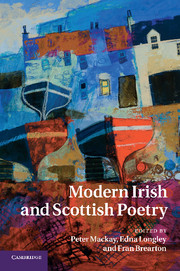Book contents
- Frontmatter
- Contents
- List of contributors
- Acknowledgements
- Introduction
- 1 Swordsmen: W. B. Yeats and Hugh MacDiarmid
- 2 Tradition and the individual editor: Professor Grierson, modernism and national poetics
- 3 Louis MacNeice among the islands
- 4 Townland, desert, cave: Irish and Scottish Second World War poetry
- 5 Affinities in time and space: reading the Gaelic poetry of Ireland and Scotland
- 6 Contemporary affinities
- 7 The Classics in modern Scottish and Irish poetry
- 8 Translating Beowulf: Edwin Morgan and Seamus Heaney
- 9 Reading in the gutters
- 10 ‘What matters is the yeast’: ‘foreignising’ Gaelic poetry
- 11 Outside English: Irish and Scottish poets in the East
- 12 Names for nameless things: the poetics of place names
- 13 Desire lines: mapping the city in contemporary Belfast and Glasgow poetry
- 14 ‘The ugly burds without wings’?: reactions to tradition since the 1960s
- 15 ‘And cannot say / and cannot say’: Richard Price, Randolph Healy and the dialogue of the deaf
- 16 On ‘The Friendship of Young Poets’: Douglas Dunn, Michael Longley and Derek Mahon
- 17 ‘No misprints in this work’: the poetic ‘translations’ of Medbh McGuckian and Frank Kuppner
- 18 Phoenix or dead crow? Irish and Scottish poetry magazines, 1945–2000
- 19 Outwith the Pale: Irish–Scottish studies as an act of translation
- Guide to further reading
- Index
- References
1 - Swordsmen: W. B. Yeats and Hugh MacDiarmid
Published online by Cambridge University Press: 18 April 2011
- Frontmatter
- Contents
- List of contributors
- Acknowledgements
- Introduction
- 1 Swordsmen: W. B. Yeats and Hugh MacDiarmid
- 2 Tradition and the individual editor: Professor Grierson, modernism and national poetics
- 3 Louis MacNeice among the islands
- 4 Townland, desert, cave: Irish and Scottish Second World War poetry
- 5 Affinities in time and space: reading the Gaelic poetry of Ireland and Scotland
- 6 Contemporary affinities
- 7 The Classics in modern Scottish and Irish poetry
- 8 Translating Beowulf: Edwin Morgan and Seamus Heaney
- 9 Reading in the gutters
- 10 ‘What matters is the yeast’: ‘foreignising’ Gaelic poetry
- 11 Outside English: Irish and Scottish poets in the East
- 12 Names for nameless things: the poetics of place names
- 13 Desire lines: mapping the city in contemporary Belfast and Glasgow poetry
- 14 ‘The ugly burds without wings’?: reactions to tradition since the 1960s
- 15 ‘And cannot say / and cannot say’: Richard Price, Randolph Healy and the dialogue of the deaf
- 16 On ‘The Friendship of Young Poets’: Douglas Dunn, Michael Longley and Derek Mahon
- 17 ‘No misprints in this work’: the poetic ‘translations’ of Medbh McGuckian and Frank Kuppner
- 18 Phoenix or dead crow? Irish and Scottish poetry magazines, 1945–2000
- 19 Outwith the Pale: Irish–Scottish studies as an act of translation
- Guide to further reading
- Index
- References
Summary
From a long literary historical perspective, William Butler Yeats and Hugh MacDiarmid can look almost like twins. Each was a poet and the central figure in a patriotically inflected literary movement that had its context in a wider cultural repudiation of English hegemony in the United Kingdom and a political challenge to the inclusion of their countries in that polity. Seeing poetry and controversy as allied activities, both writers were vigorous self-mythologisers whose interventions in public life were condemned as hubristic by their opponents. Yeats and MacDiarmid not only projected themselves as avatars of a resurgent phase in the history of their ancient nations but shared a vision of leadership by aesthetic example – their distinctively national poetry (and, in the Irish poet's case, drama) would give their compatriots an enhanced sense of the riches of the past and the possibilities of the future, while their propagandistic endeavours would at once energise their art and create the conditions for its reception. They even shared a response to disappointment in the latter objective, exploiting it as an occasion of querulous lyric eloquence.
On closer inspection, however, the parallels become less persuasive. Even if the Scottish Literary Renaissance inaugurated by MacDiarmid was modelled to a degree on the Irish Literary Revival led by Yeats, these were in important respects disparate phenomena, which took place in divergent circumstances.
- Type
- Chapter
- Information
- Modern Irish and Scottish Poetry , pp. 20 - 38Publisher: Cambridge University PressPrint publication year: 2011
References
- 12
- Cited by



